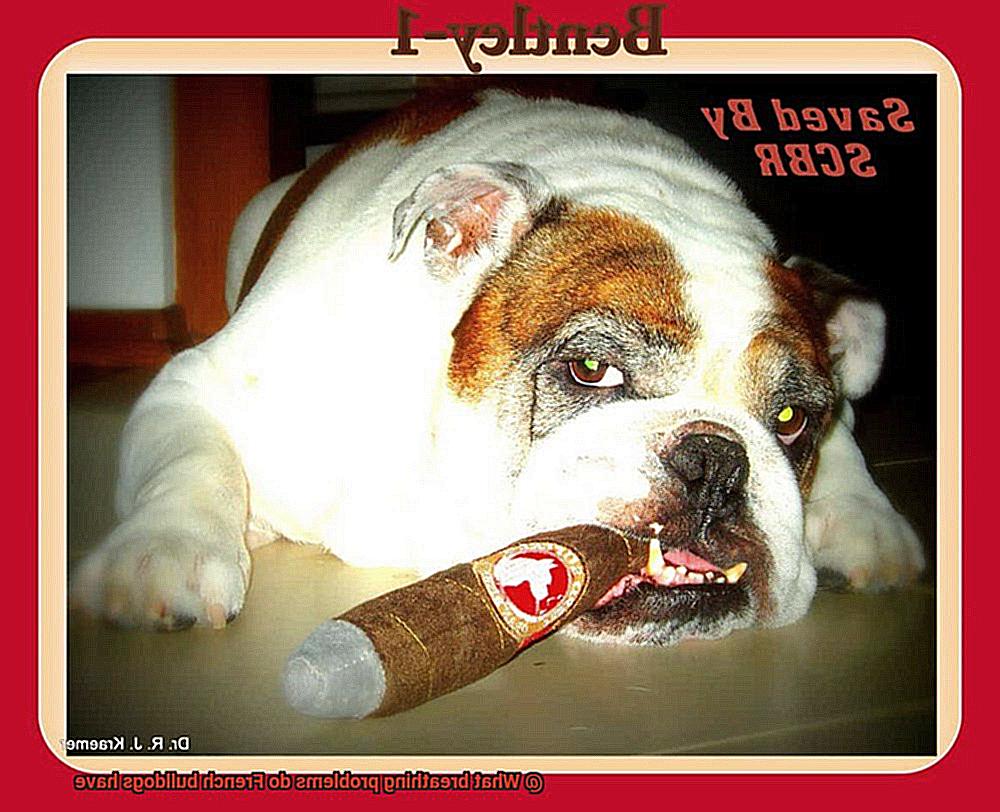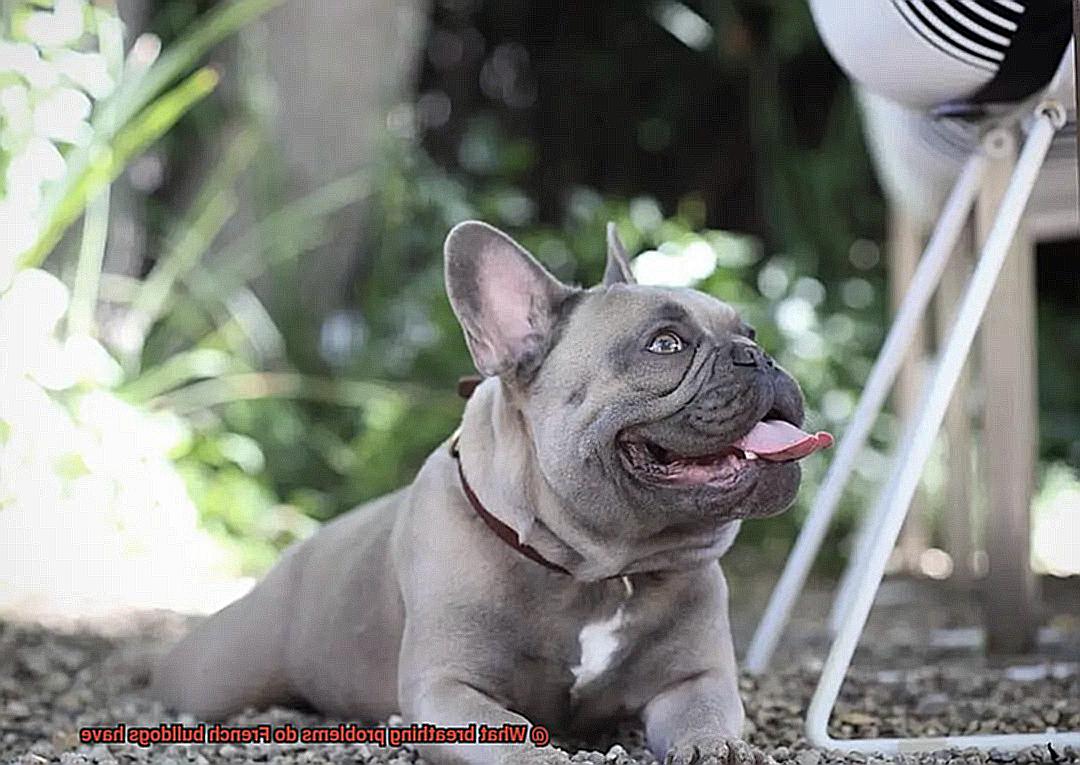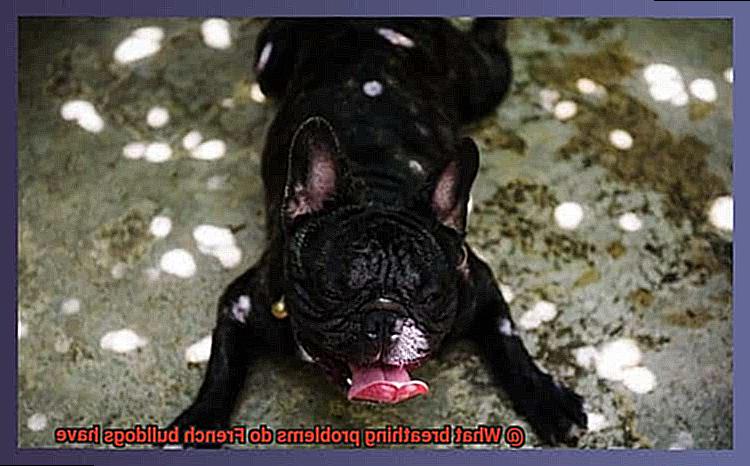What breathing problems do French bulldogs have?
French bulldogs are one of the world’s most popular dog breeds. Their adorable faces, friendly personalities and compact size make them a favorite companion for many families.
However, did you know that French bulldogs are also prone to respiratory problems? If you’re wondering “what breathing problems do French bulldogs have?”, you’ve come to the right place.
French bulldogs are brachycephalic dogs, meaning their heads are short and wide in comparison to other breeds. This causes their noses and throats to be squished together, resulting in airway blockage, snoring, snorting sounds as they breathe and heat intolerance due to their inability to cool themselves efficiently.
Tracheal or laryngeal lysis can also occur in Frenchies, causing squeaky breathing or complete blockage of the airway. These conditions can be life-threatening if not treated promptly.
So, it’s important to rush your Frenchie to the hospital if any signs appear. Allergies, bronchitis and pneumonia can also develop due to moisture trapped in their lungs from their apartment environment.
It is vital for owners of French bulldogs to watch out for signs of respiratory distress such as coughing, wheezing or labored breathing. If any of these signs occur, seek medical attention right away as some of these disorders can progress rapidly without treatment.
What is Brachycephalic Airway Syndrome (BAS)
Contents
- 1 What is Brachycephalic Airway Syndrome (BAS)
- 2 Causes of BAS in French Bulldogs
- 3 Signs and Symptoms of Breathing Problems in French Bulldogs
- 4 Diagnosis and Treatment of Breathing Problems in French Bulldogs
- 5 How to Prevent Breathing Problems in French Bulldogs
- 6 Common Treatments for Breathing Problems in French Bulldogs
- 7 Surgery Options for Treating Breathing Problems in French Bulldogs
- 8 Cost of Surgery for Treating Breathing Problems in French Bulldogs
- 9 Conclusion
You should be aware of Brachycephalic Airway Syndrome (BAS), a condition that affects short-nosed dogs like French bulldogs.
BAS is caused by the abnormal development of the dog’s respiratory system, leading to a narrowing of the airways and resulting in difficulty breathing and other serious health problems.
Common symptoms of BAS include snoring, gagging, coughing, wheezing, and exercise intolerance. In severe cases, this disorder can cause life-threatening respiratory distress and even death.
If your French bulldog is exhibiting any signs of difficulty breathing or other respiratory issues, it is essential to bring them to the vet for diagnosis and treatment right away.
Treatment for BAS typically involves corrective surgery to widen the airways and reduce symptoms. However, not all cases require surgery; some dogs may respond well to lifestyle changes such as weight loss or avoiding strenuous activity.
Maintaining a healthy weight is especially important for French bulldogs with BAS as obesity can put extra strain on their airways and worsen their symptoms.

Causes of BAS in French Bulldogs
You may be familiar with Brachycephalic Airway Syndrome (BAS). This condition affects the airways of French bulldogs, making it difficult for them to breathe. Left untreated, BAS can lead to serious health issues and even be life-threatening.
The cause of BAS is usually related to the shape of their head and muzzle, which creates an obstruction in their airways. But there are other factors that can contribute to this condition, such as genetics, environmental causes like being overweight, allergies, infections and traumas.
If your French bulldog is having signs of difficulty breathing or other respiratory problems, it is essential to take them to the vet for diagnosis and treatment right away.
Treatment for BAS depends on the severity of the symptoms and can range from medications to surgery. In some cases, lifestyle changes like weight loss and avoiding allergens can help improve breathing issues in French bulldogs with BAS.
Keeping your dog at a healthy weight is especially important as obesity can place more strain on their airways and worsen their asthma.
Signs and Symptoms of Breathing Problems in French Bulldogs
If you own a French Bulldog, it is essential to be aware of the signs and symptoms that can indicate a respiratory disorder. Because of their flat faces and short snouts, French Bulldogs are prone to Brachycephalic Airway Syndrome (BAS), which can cause various breathing problems.
Common signs of respiratory issues in French Bulldogs include difficulty breathing, wheezing, snorting, gagging, and labored breathing. If your Frenchie has any of these symptoms, it is important to take them to the vet immediately for diagnosis and treatment. Other warning signs include lethargy or lack of energy, weight loss, poor appetite, and frequent panting.

It’s also vital to watch out for more serious signs such as cyanosis, collapse or fainting spells, and excessive salivation. These may be indicators of an underlying health condition that should be treated by a doctor right away.
Diagnosis and Treatment of Breathing Problems in French Bulldogs
Owning a French Bulldog can be an incredibly rewarding experience, but it is also important to be aware of the potential breathing difficulties they may face. French Bulldogs are prone to Brachycephalic Airway Syndrome (BAS), due to their short snouts and flat faces, which can cause respiratory issues such as wheezing, snorting, and gagging.
If your Frenchie displays any of these signs, it is essential to take them to the vet for diagnosis and treatment.
Diagnosing breathing problems in French Bulldogs typically requires physical examination, radiographs, and endoscopy. Treatment of these issues may include medications such as bronchodilators and corticosteroids to reduce inflammation and improve airflow.
In more severe cases, surgery may be recommended. The cost of surgery for French Bulldog breathing problems can vary depending on the type of surgery required and the severity of the condition.
It is important for owners to keep an eye out for signs and symptoms of respiratory disease in their French Bulldog so that they can seek medical attention if necessary.

Common indicators include labored breathing, panting, coughing, lethargy, hunger, food loss, poor appetite, cyanosis (blue or purple gums/tongue), excessive salivation, and exercise intolerance.
How to Prevent Breathing Problems in French Bulldogs
French Bulldogs are beloved pets, but their short snouts and flat faces make them more prone to respiratory difficulties.
To keep your Frenchie healthy and happy, it’s important to take steps to prevent any breathing issues. Here are six tips for preventing respiratory problems in French Bulldogs.
Vaccinate
Vaccinations are essential for all dogs, especially for French Bulldogs, as they help protect against respiratory infections like kennel cough that can lead to breathing problems.

Make sure your Frenchie is up-to-date on all of their vaccinations and consult with your vet about any additional vaccines that may be required for your dog.
Grooming
Regular grooming is important to keep your Frenchie’s coat clean and free of allergens that can cause respiratory difficulties. Make sure you clean your dog’s hair regularly and use a French-specific shampoo if necessary.
Avoid Smoke and Toxins
Smoke, dust, perfumes and other irritants can cause breathing problems in French Bulldogs, so it’s important to keep your home free of these irritants as much as possible.
If you’re a smoker or use any scented items in the house, open windows often for fresh air or invest in an air purifier to keep the air quality good for your pup.

Reduce Stress
Stress can have a negative effect on your pup’s wellbeing, so make sure you create a stress-free environment with plenty of mental stimulation with toys and activities and do not leave them alone for long stretches of time or expose them to loud noises or unfamiliar animals that could cause distress.
Feed A Balanced Diet
A healthy diet is essential for all pets, but especially for French Bulldogs as they are prone to certain food allergies and sensitivities.
Feeding your Frenchie a balanced diet of high-quality food will help keep them healthy and prevent breathing problems related to obesity or other health issues related to inadequate diet.
Visit the Vet Regularly
Regular checkups with the vet can help identify any potential breathing problems early on and ensure that your Frenchie is getting proper care if necessary.

Make sure you visit the vet at least once a year for an annual physical examination so that any potential problems can be addressed quickly before they become chronic medical disorders that necessitate more intensive care or therapy.
Common Treatments for Breathing Problems in French Bulldogs
French bulldogs are beloved for their loyal and affectionate nature, but the short snouts and flat faces that make them so adorable can also lead to breathing difficulties.
If your Frenchie is having trouble catching their breath, there are several treatments available to help them manage their symptoms. Here are seven common treatments for breathing problems in French Bulldogs.
Surgery
In some cases, surgery may be necessary to correct a French bulldog’s breathing problems. Common procedures include removing excess tissue from the throat, widening the nostrils, and clearing any obstructions from the airways.
Medication
Depending on the type of breathing problem, medication may be prescribed to help manage symptoms and improve breathing. Popular medications for French bulldogs include bronchodilators, antihistamines, and corticosteroids.
Diet
Certain dietary changes can help improve your French bulldog’s breathing problems. This includes avoiding foods that are high in fat or sugar as well as those with artificial additives or preservatives.

Exercise
Regular exercise is essential for improving your French bulldog’s respiratory issues by strengthening the muscles used for breathing and increasing lung capacity. Swimming is an excellent form of exercise for French bulldogs with respiratory issues because it is low-impact yet effective at opening up their airways.
Lifestyle Changes
Making lifestyle changes such as avoiding smoke or other pollutants can also help reduce your French bulldog’s symptoms of respiratory distress. Additionally, keeping your home clean and free of allergens can help reduce exposure to irritants that may trigger a breathing issue in your pet.
Surgery Options for Treating Breathing Problems in French Bulldogs
Surgery may be the best option for treating their respiratory issues. It is the most common treatment for French Bulldogs with breathing problems, helping to open up their airway and allow more air to flow through.
The most common type of surgery used is a tracheal stent, which involves inserting a small tube into the trachea to keep it open and facilitate better airflow. Other procedures may involve removing excess tissue from the throat, extending the nostrils, or removing any blockages from the airways.
Surgery can be expensive, but it is often essential to ensure that your French Bulldog maintains a healthy breathing pattern. Before deciding on a course of action for your dog’s respiratory issues, it’s important to talk to your vet about all potential options.
Additionally, making lifestyle changes such as avoiding smoke or other harmful chemicals and keeping your house clean and free of allergens can help reduce exposure to irritants that may cause a respiratory disease in your pup.
If you think that surgery is necessary for your French Bulldog’s breathing problems, make sure you consult with your vet about all available treatments before making a decision.
Cost of Surgery for Treating Breathing Problems in French Bulldogs
When it comes to treating breathing problems in French bulldogs, surgery is often the best option.
However, it can come at a hefty cost. Depending on the severity of the respiratory disease and the type of procedure required, surgery costs can range from a few hundred dollars to thousands.
Common surgeries for French bulldogs include tracheal resection, laryngeal tieback, or arytenoid lateralization.
In some cases, medications may be prescribed to help with breathing difficulties in French bulldogs. But consulting with a veterinarian is essential for determining the best course of treatment for your pet. The cost of surgery should also be taken into consideration when deciding whether or not it is necessary.
If you’re worried about the price tag associated with surgery, there are options such as financing or pet insurance that may be able to pay for part or all of the surgery costs.
It’s important to talk to your vet about all potential outcomes so you can make an informed decision about what is best for your beloved pup.
Conclusion
French bulldogs are beloved by many, but their short snouts and flat faces can lead to life-threatening respiratory difficulties. Brachycephalic Airway Syndrome (BAS) is the most common disorder affecting French Bulldogs, causing symptoms like snoring, gagging, coughing and wheezing. If left untreated, this condition can be fatal.
Fortunately, BAS and other breathing problems in French Bulldogs can be treated.
Treatment options range from widening the airways with surgery, to drugs such as bronchodilators and corticosteroids that reduce inflammation and improve airflow, to lifestyle habits like weight loss and avoiding allergens. Depending on the severity of the illness, costs may vary.
It’s important to know the signs of breathing difficulties in your French Bulldog so you can seek medical attention if necessary.
Look out for labored breathing, panting, lethargy, hunger or lack of appetite, cyanosis, excessive salivation and exercise intolerance.
Additionally, preventive steps such as vaccinations and regular grooming can help keep your pup healthy by limiting exposure to irritants that can cause a breathing disorder.




